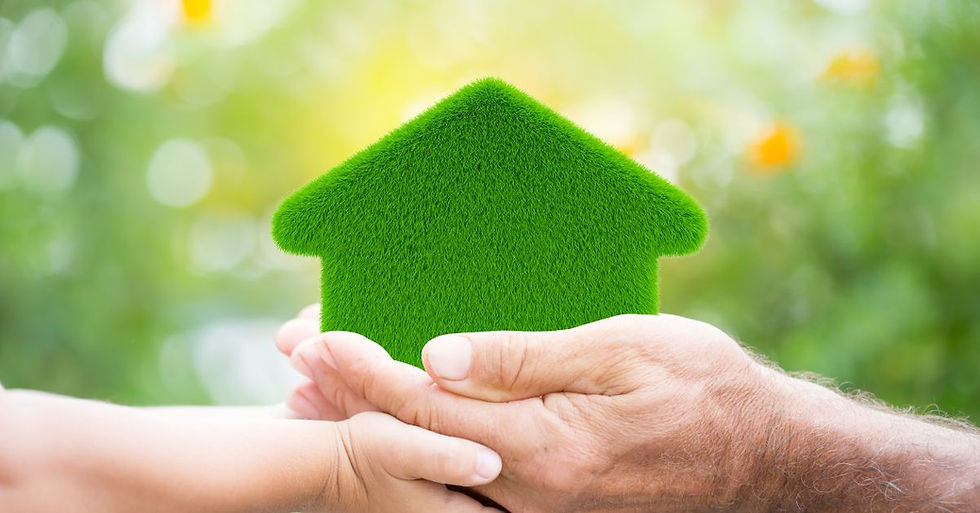When Is It Worth Investing in Eco-Friendly Renovations?
- Abask Marketing
- May 29, 2024
- 4 min read

As a real estate investor, knowing when it is worth investing in eco-friendly renovations in your properties can be challenging. These renovations are popular among homeowners and tenants and could save you money in the long run, but they will be initially expensive. So, how do you find a strategic time to make these investments? Let's talk about it.
With over 15 years of experience in real estate development, Regalway Homes has earned a stellar reputation among clients and investors. Based in Milton, Ontario, our family-owned business specializes in real estate development, wealth management, growth, and acquisition across Canada. To schedule a time to talk to development experts, visit www.regalwayhomes.com/contact and schedule your free consultation.
Financial Benefits: Short-Term Costs vs. Long-Term Savings
One of the primary concerns for homeowners considering eco-friendly renovations is the cost. Sustainable materials and technologies can be more expensive upfront than traditional options. However, the long-term savings often outweigh the initial expenditure.
Upgrading to energy-efficient appliances, insulation, windows, and HVAC systems can significantly reduce your energy bills. For example, installing solar panels might come with a hefty initial price tag, but they can drastically lower or even eliminate electricity bills over time. Similarly, investing in water-saving fixtures like low-flow toilets, showerheads, and faucets can reduce water bills. Rainwater harvesting systems and greywater recycling can also provide substantial savings. Over time, these savings can recoup the initial investment and continue to save money.
Many governments offer incentives such as tax credits, rebates, and grants for environmentally friendly renovations. These incentives can reduce the upfront costs, making it more financially feasible to go green. For instance, the Greener Homes Initiative in Canada offers grants and interest-free loans to Canadian homeowners for energy-efficient home upgrades, aiming to reduce energy bills and environmental impact. One of the primary concerns for homeowners considering environmentally friendly renovations is the cost. Sustainable materials and technologies can be more expensive upfront than traditional options. However, the long-term savings often outweigh the initial expenditure.
Environmental Impact: Making a Difference Now
The environmental benefits of eco-friendly renovations are immediate and significant. Reducing energy and water consumption can lower your carbon footprint and contribute to the global effort to combat climate change. Energy-efficient homes consume less power, leading to reduced greenhouse gas emissions. Switching to renewable energy sources like solar or wind further decreases reliance on fossil fuels. These changes help mitigate climate change and reduce air pollution, benefiting local communities.
Environmentally friendly renovations often involve using sustainable materials with a lower environmental impact than traditional materials. For example, bamboo flooring, reclaimed wood, and recycled metal roofing are all environmentally friendly choices that conserve natural resources and reduce waste. Conserving natural resources is an important aspect of environmentally friendly renovations, and using sustainable materials is a great way to achieve this.
During renovations, choosing to recycle or reuse materials can minimize waste. Deconstructing instead of demolishing allows for materials like bricks, wood, and fixtures to be salvaged and reused. This practice not only reduces landfill waste but also conserves resources. Waste reduction is essential to eco-friendly renovations, and the conscious effort to minimize waste can positively impact the environment.
Increasing Home Value: The Market Appeal of Green Homes
Investing in sustainable renovations for your home can significantly increase its market value and appeal to a growing segment of eco-conscious buyers. Studies have shown that homes with energy-efficient features and sustainable upgrades sell for a premium compared to conventional homes. For example, the Appraisal Institute found that green homes can sell for up to 9% more than non-green homes.
The demand for green homes is on the rise, with many buyers willing to pay more for homes with eco-friendly features, as indicated by a report from the National Association of Realtors. This trend is expected to grow as more people become aware of the benefits of sustainable living. Additionally, homes with green certifications or energy-efficient upgrades often spend less time on the market. Buyers are increasingly looking for move-in ready homes with cost savings and environmental benefits, making eco-friendly homes a hot commodity.
Contributing to a Sustainable Future: Ethical and Social Considerations
Investing in environmentally friendly renovations is not just a personal financial decision; it's also an ethical one. By making sustainable choices, homeowners contribute to a more significant societal shift towards environmental responsibility. For many, investing in eco-friendly renovations stems from a sense of ethical responsibility. Reducing environmental impact, conserving resources, and supporting sustainable practices are all part of being a responsible global citizen.
Eco-friendly homes can positively impact the local community. Reduced energy consumption can lower the strain on regional power grids, while improved water conservation can benefit local water supplies. Additionally, choosing local and sustainable materials supports the local economy and promotes responsible industry practices.
Furthermore, environmentally friendly renovations often improve indoor air quality and create healthier living environments. Using non-toxic materials, improving ventilation, and installing air purification systems can reduce exposure to harmful pollutants, leading to better health
outcomes for occupants.
Deciding when to invest in eco-friendly renovations involves weighing several factors. Financial considerations, such as upfront costs and long-term savings, play a significant role. However, the immediate environmental impact, potential increase in home value, and ethical considerations are equally important.
Investing in eco-friendly renovations should align with your values, financial situation, and long-term goals. By carefully evaluating these factors, you can make an informed choice that benefits you and the planet. Whether you're motivated by cost savings, environmental responsibility, or the desire to increase your home's market value, environmentally friendly renovations offer numerous advantages that make them a worthy investment.
Want to learn more about eco-friendly renovations in your specific property? Schedule a free consultation with Regalway Homes today by visiting www.regalwayhomes.com/contact to speak to a real estate development expert.

Comments